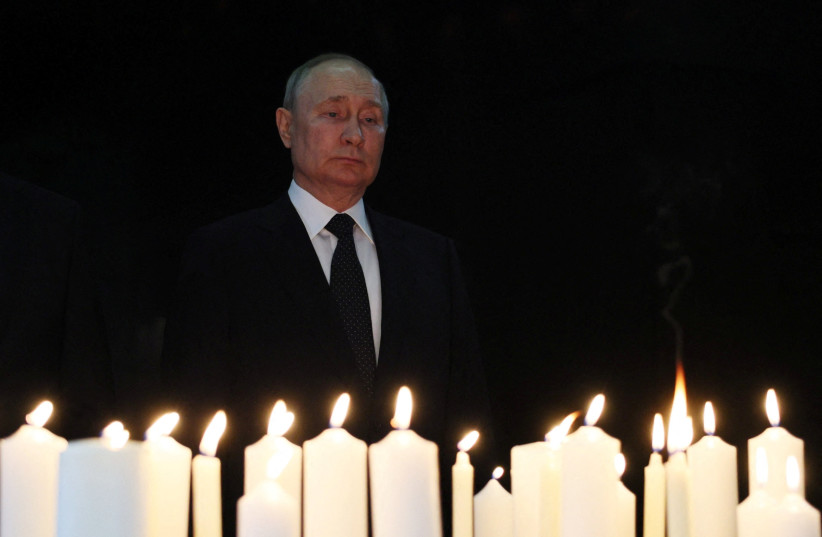Israel’s policy toward Ukraine since Russia invaded last year has remained remarkably consistent, even after the ascendance of a government in Jerusalem that is diametrically opposed to its predecessor on most issues.
The situation in Ukraine and Russia, however, has been far from static, and the latest developments, such as the attempted Wagner coup against Russian President Vladimir Putin, raise questions as to whether Israel’s policy makes as much sense as it did a year ago.
Prime Minister Benjamin Netanyahu explained his policy toward Ukraine, which is identical to that of former prime minister Naftali Bennett, in an interview with The Jerusalem Post last week.
What is Israel's cautious policy towards Ukraine amid the war with Russia?
“I think Israel is in a peculiar situation, different from say, Poland or Germany or France or any of the Western countries that are assisting Ukraine,” he said. “First of all, we have a close military border with Russia. Our pilots are flying right next to Russian pilots over the skies of Syria. And I think it’s important that we maintain our freedom of action against Iran’s attempts to place itself militarily on our northern border.
“Second, we also have concerns that any systems that we give to Ukraine would be used against us because they could fall into Iranian hands and be used against us,” he added.

The prime minister said that Israel “obviously bemoan[s] the tragedy that’s happening in Ukraine, this horrible loss of human life. We’d like to see it end. And I think we’re also in a special situation where we might find ourselves in the future in a position to help end this conflict…There is sympathy, there is civilian defense assistance. But I think we have to draw the line carefully and people understand.”
Another concern Israeli officials mention is the large Jewish community in Russia.
Israel does not provide Ukraine with military aid, including missile defense systems, for these reasons. At the same time, Jerusalem has given Kyiv humanitarian aid and missile warning systems, as well as voted with Ukraine on UN General Assembly resolutions relating to the war.
Most of the reasons Israel provided rely on a working relationship with Putin and his government. The deconfliction mechanism in Syria is worked out at the highest levels of government and the military. The Jewish community in Russia benefited to some extent from Putin’s relative friendliness toward them, but is vulnerable to the Kremlin’s whims.
After this weekend, however, it is unclear how long Putin will be able to keep up his end of the bargain when it comes to Israel.
Does the Wagner Group's attempted coup against Russia's Vladimir Putin change things for Israel?
One certainly should not eulogize Putin before his time. After all, Turkish President Recep Tayyip Erdogan faced an attempted coup in 2016, and not only stayed in office but was just reelected this year.
That being said, Erdogan decisively and violently crushed the coup.
Putin, however, gave a speech in the morning about the Wagner mercenaries being traitors after they left Ukraine and started advancing towards Moscow. Then, the Russian Army did little to counter Wagner’s advance. By night, Putin had struck a deal with Wagner Group chief and once-ally Yevgeny Prigozhin, exiling him and agreeing to absorb some of the mercenaries into Russia’s official military ranks. And Putin did not get back on TV to try to spin what had happened.

It was anything but a decisive victory. Conspiracy theories immediately abounded on the Internet, but Occam’s Razor says that what we saw is probably what really happened.
That leaves a Putin whose power base is far less stable than it was before, making any agreements with him more precarious.
The Wagner Coup, Iran, and Netanyahu's concerns for Israeli operations in Syria
In addition, the Wagner Group has been a key part in Russia’s military involvement in Syria. If Moscow cannot control them, can it really guarantee there won’t be a confrontation with IAF planes over Israel’s northern border?
Then there is Netanyahu’s concern that defensive systems given to Kyiv would fall into Tehran’s hands.
As Ukrainian Ambassador to Israel Yevgen Kornichuk pointed out, the systems his country has asked for are defensive weapons, namely anti-missile systems. They would be right outside civilian centers to protect them from Russian projectiles – including Iranian-made drones – and not in the middle of battlefields.
In addition, Kornichuk said, if the US found ways to track the use of its weapons to ensure they don’t reach the wrong hands, then Israel can do the same.
Iran-Russia cooperation is not only a reason for concern about Ukraine for Israel, it could also represent an opportunity. There has been a bit of intelligence-sharing between Kyiv and Jerusalem, but this is a chance for more. In addition, it’s a chance to test out Israeli systems against Iranian weapons that have not yet reached the enemies on Israel’s borders.
The Ukrainian Embassy argued in a strongly-worded statement released on Sunday that Israel has “a clear pro-Russia position.”
In fact, Israel’s position is more complex than that. Israelis, including the leadership, tend to instinctively sympathize with Ukraine in this conflict, and they have expressed that repeatedly in words, UN votes and humanitarian aid. However, Israelis are, as always, deeply worried about Israel’s security interests.
That being said, the events of the last weekend have made Israel’s Ukraine position make less sense than it did in the past. What seemed reasonably cautious at the start of the war last year, is now looking calcified and out of date. The Wagner Group’s march on Moscow could be a wakeup call to Jerusalem to be a little less afraid of actions that could poke the Russian bear.
